Photo source: FreeBibleImages.org
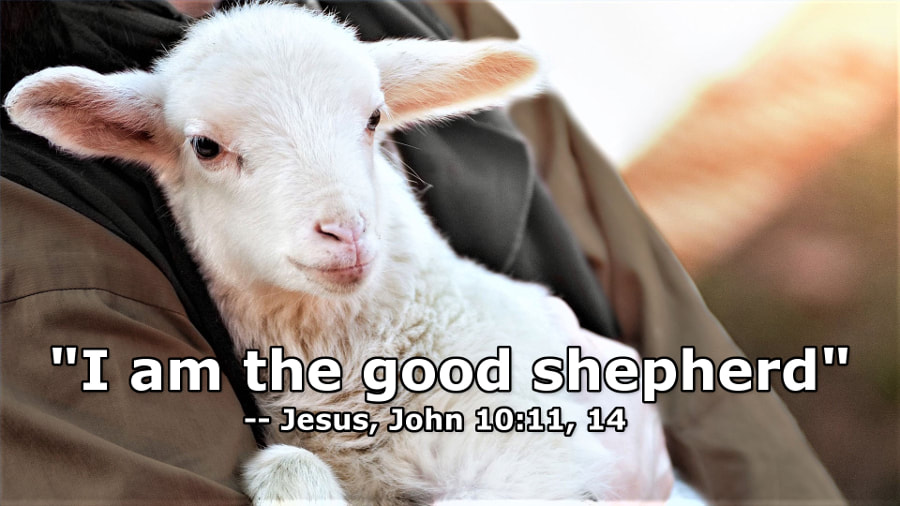
The Good Shepherd. Photo Copyright David Padfield. Used under license. Jesus said, “I am the good shepherd” (John 10:11, 14). Jesus told a parable about a good shepherd who went searching for one of his sheep that was lost (Luke 15:1-7). Jesus said, “For the Son of Man has come to seek and to save that which was lost” (Luke 19:10).
"Our Lord not only declares that He is the reality of which the earthly shepherd is the shadow, and that He as the flawless, perfect One, but that He alone is the reality. 'I am the Good Shepherd; in Me and in Me alone is that which men need.' " -- Alexander MacLaren (1826-1910) (Ref. 1, Ref. 2)
This lesson is the fourth in a series on the "I AM" statements of Christ. This lesson discusses Jesus' statements, "I am the good shepherd," in John 10:11 and John 10:14.
Consider. Are you like a lost sheep? Have you gone astray (Isaiah 53:6)? Are you living outside of the sheepfold? Jesus Christ is the Good Shepherd, the one who loves us, seeks us, saves us, and protects us. He is the one who laid down his life for his sheep. He is the one who knows us.
God is Our Shepherd (Old Testament Perspective)
The Old Testament describes God as the shepherd for his people. God is the one who cares for the total well-being of his sheep. David wrote, "The Lord is my shepherd, I shall not want. He makes me lie down in green pastures; He leads me beside quiet waters. He restores my soul; He guides me in the paths of righteousness For His name’s sake" (Psalm 23:1-3).
In a perhaps less widely-known passage, Ezekiel also described the characteristics of the Lord God as the shepherd of Israel (Ezekiel 34:11-16):
Hundreds of years before Jesus came, Isaiah spoke of Jesus. "He shall feed his flock like a shepherd: he shall gather the lambs with his arm, and carry them in his bosom, and shall gently lead those that are with young" (Isaiah 40:11). "I Am the Good Shepherd"
The Greek word for good means beautiful, as an outward sign of inward good, noble, honorable character (Ref. 3). Think of the greatness and the immensity of the claim that Jesus makes upon our faith in John 10:11 and John 10:14. Jesus claims to be the divine shepherd witnessed to and described by the psalmist and the prophets.
Jesus states that in him alone is everything that we need - sustenance, protection, care, restoration, direction, and eternal life (Luke 15:4, Luke 19:10, Psalm 23:1-3, John 10:3-4, John 10:9, John 10:27-28, Ref. 1). The Greek text in John 10:11 and John 10:14 uses the definite article "the" before "good shepherd" (Ref. 4, Ref. 5). "The definite article claims this ['I am the good shepherd'] as a description applicable to Himself alone" (Expositor's Greek Testament - Ref. 6, brackets added). "The Good Shepherd Lays Down His Life for the Sheep"
Jesus states two features by which he as the good shepherd would be known. The first feature is his giving his life for the sheep (John 10:11, Ref. 6). Recall the personal risk of life that David faced because he was a shepherd. David himself rescued the lamb of his father's flock from the mouth of the lion and the bear (1 Samuel 17:34-36, Ref. 7). "That self-sacrifice that would lead the shepherd to risk his own life for that of the flock has its ideal fulfillment in Him who is the Good Shepherd, and will give His life for mankind" (Ref. 7).
"The death of the Shepherd is the security of the sheep; and I say to you, the flock, that for every soul the entrance into the flock of God is through the door of the dying Christ, who laid down His life for the sheep, and makes them His sheep who trust in Him" (Ref. 1, Ref. 8). "I Know My Own and My Own Know Me"
Jesus stated a second feature by which he would be known as the good shepherd. That feature is the reciprocal knowledge of the sheep and the shepherd (John 10:14, Ref. 6). The Greek word for know in John 10:14 is ginóskó, which means to know, especially through personal experience (Ref. 9). However, the language for know in John 10:14 describes more than a dictionary lookup alone conveys. Jesus describes closest communion between himself as the good shepherd and his sheep (Ref. 7). Jesus describes the relationship as loving regard, affection, and recognition between the shepherd and his sheep (Ref. 1). He knows us because he loves us. As his sheep, we know him as our shepherd, and we love him and trust him. We know his voice and we follow him (John 10:4, John 10:27-28).
Apply. Jesus loves you and already knows you. Jesus wants to have a close reciprocal relationship with you. Are you loving him, trusting him, and following him today?
References
1. https://biblehub.com/commentaries/maclaren/john/10.htm 2. https://en.wikipedia.org/wiki/Alexander_Maclaren 3. https://biblehub.com/greek/2570.htm 4. https://biblehub.com/interlinear/john/10-11.htm 5. https://biblehub.com/greek/3588.htm 6. https://biblehub.com/commentaries/egt/john/10.htm 7. https://biblehub.com/commentaries/ellicott/john/10.htm 8. http://www.ScriptureWay.com/home/jesus-is-the-door 9. https://biblehub.com/greek/1097.htm
0 Comments
Photo source: FreeBibleImages.org
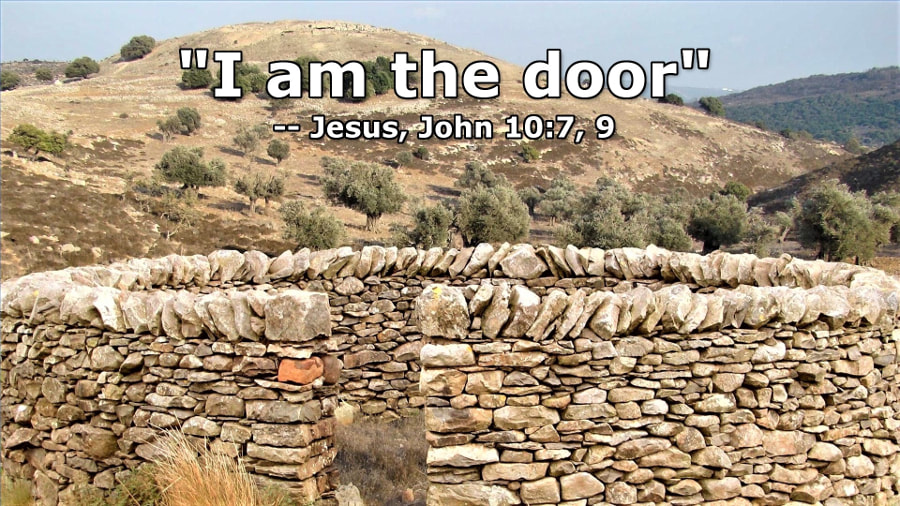
Permanent Sheepfold Enclosure - Holy Land. Photo Copyright David Padfield. Used under license. Permanent sheepfolds were built on the sunny side of valleys where there is protection from cold winds. These had stone walls, 4-5ft high and one entrance guarded by the shepherd. Thorns were often put on the top of walls to deter wild animals. Jesus referred to such a sheepfold and to thieves and robbers climbing over the wall (John 10:1-3).
"So Jesus said to them again, 'Truly, truly, I say to you, I am the door of the sheep.' " (John 10:7, Ref. 1)
"I am the door; if anyone enters through Me, he will be saved, and will go in and out and find pasture." (John 10:9)
"Christ is the Door. And what greater security has the church of God than that the Lord Jesus is between it and all its enemies? ... Here are plain directions how to come into the fold; we must come in by Jesus Christ as the Door." -- Matthew Henry (Ref. 2)
This lesson is the third in a series on the "I AM" statements of Christ. This lesson discusses Jesus' "I am the door" statements in John 10:7 and John 10:9.
Consider. Have you entered into the church of God by believing in the Lord Jesus Christ? Are you experiencing spiritual nourishment in Christ? "If anyone enters through Me" - John 10:9
We enter the sheepfold, the church of God, through Jesus Christ (and only through Jesus Christ). Jesus said, "Truly, truly, I say to you, I am the door of the sheep" (John 10:7). We enter that door when we place our faith and trust in Jesus Christ. "As the only proper way of entering the fold was by the door, so the only way of entering the church of God is by believing on him and obeying his commandments" (Ref. 3).
Jesus said, "I am the way, and the truth, and the life; no one comes to the Father but through Me" (John 14:6). "He will be saved"
Once we have entered the door by faith and trust in Jesus Christ, we are saved. Jesus delivers us from perils such as ravenous wolves and false shepherds (Ref. 4, John 10:1-2). Jesus frees us from the power, guilt, and penalty of sin (Romans 8:1-2, Ephesians 2:1-9). Jesus gives us eternal security. Jesus said, "My sheep hear My voice, and I know them, and they follow Me; and I give eternal life to them, and they will never perish; and no one will snatch them out of My hand" (John 10:27-28).
HELPS Word-Studies defines saved as rescued from destruction and brought into divine safety (Ref. 5). "And will go in and out and find pasture"
To go "in and out" is the common Old Testament expression to denote free activity of daily life (Ref. 6). When Moses charged the Israelites at Mount Gerizim to obey the Lord, he said, "Blessed shall you be when you come in, and blessed shall you be when you go out" (Deuteronomy 28:6, Deuteronomy 27:11-12, Deuteronomy 28:1-2). David wrote about the Lord, the Keeper of Israel (Psalm 121:5). David said, "The Lord will guard your going out and your coming in from this time forth and forever" (Psalm 121:8).
Through Jesus (because he is the door), we have security for our daily needs and nourishment for our souls. Under the care of Jesus, we find pasture - food for our souls (Ref. 7). David wrote, "The Lord is my shepherd; I shall not want. He maketh me to lie down in green pastures: he leadeth me beside the still waters" (Psalm 23:1-2 KJV).
Apply. Have you entered the sheepfold of Christ by believing in him? If not, then put your faith and trust in him today. Are you spending time with Jesus daily to receive spiritual nourishment? How can you improve in this area?
References
1. http://www.ScriptureWay.com/home/when-jesus-said-truly-truly-what-did-he-mean 2. https://biblehub.com/commentaries/mhc/john/10.htm 3. https://biblehub.com/commentaries/barnes/john/10.htm 4. https://biblehub.com/commentaries/pulpit/john/10.htm 5. https://biblehub.com/greek/4982.htm 6. https://biblehub.com/commentaries/egt/john/10.htm 7. https://biblehub.com/commentaries/benson/john/10.htm
"Jesus said to them, 'I am the bread of life; he who comes to Me will not hunger, and he who believes in Me will never thirst.' " (John 6:35)
"Christ shows that he is the true Bread; he is to the soul what bread is to the body." -- Matthew Henry (Ref. 1)
This lesson is the second in a series on the "I AM" statements of Christ. This lesson discusses Jesus' statement, "I am the bread of life" (John 6:35).
Consider. Have you come to Jesus, the Source of sustenance and strength for your spiritual life?
God-provided bread from heaven
Jesus' Jewish listeners knew that God had provided bread from heaven (also called "manna") to the Israelites. "Then the Lord said to Moses, 'Behold, I will rain bread from heaven for you; and the people shall go out and gather a day’s portion every day, that I may test them, whether or not they will walk in My instruction' " (Exodus 16:4). The manna that God provided was essential for the Israelite's survival (Exodus 16:35). Note, however, at that time God did not provide the manna universally to all people. Exodus tells us that God provided the manna only for the Israelites, and the manna was temporary (Exodus 16:35). The people who ate the manna eventually died (John 6:49).
"I am the bread of life"
In contrast with the manna that God provided temporarily to the Israelites, Jesus states emphatically, "I am the bread of life."
"He who comes to Me will not hunger, and he who believes in Me will never thirst"
Before the manna could benefit the Israelites, they had to eat it. In the same way, for Christ to provide us spiritual sustenance and eternal life, we must come to him and believe in him. When we come to Christ and believe in Christ, he alone satisfies the hunger and thirst of our souls (Matthew 5:6, John 7:37).
The Samaritan woman at the well responded to Jesus. She said, "Sir, give me this water, so I will not be thirsty nor come all the way here to draw" (John 4:15). The multitude responded to Jesus when he described the bread of heaven (John 6:33). They said, "Lord, always give us this bread" (John 6:34).
Apply. What is your response to Jesus? Will you come to him and believe in him? Come to him, believe in him, and you will receive the bread of life that your soul craves.
"Then Jesus again spoke to them, saying, 'I am the Light of the world; he who follows Me will not walk in the darkness, but will have the Light of life.' " (John 8:12)
"I have come as Light into the world, so that everyone who believes in Me will not remain in darkness." (John 12:46)
"Christ is the Light of the world. God is light, and Christ is the image of the invisible God. One sun enlightens the whole world; so does one Christ, and there needs no more." -- Matthew Henry (1662-1714) (Ref. 1, Ref. 2)
This lesson is the first in a series on the "I AM" statements of Christ. This lesson discusses Jesus' statement, "I am the Light of the world" (John 8:12).
Consider. What does it mean to you that Jesus is the Light of the world? Do you have the Light of life?
God is Light
The teaching that God is Light begins in the Old Testament and continues through the New Testament. David wrote, "The Lord is my light and my salvation; Whom shall I fear?" (Psalm 27:1). The prophet Micah said, "Though I dwell in darkness, the Lord is a light for me" (Micah 7:8). The disciple John, wrote, "God is Light, and in Him there is no darkness at all" (1 John 1:5).
God's Light Purposely Illumines Mankind
Jesus' Jewish listeners would recall Exodus 13:21 - "The Lord was going before them in a pillar of cloud by day to lead them on the way, and in a pillar of fire by night to give them light, that they might travel by day and by night." The psalmist wrote, "Thy word is a lamp unto my feet, and a light unto my path" (Psalm 119:105). The author of 2 Samuel 22:29 tells us "For You are my lamp, O Lord; And the Lord illumines my darkness."
"I am the Light of the world"
Jesus, the Eternal One, is the Light of the world because:
"He who follows Me will not walk in the darkness"
Let's discuss this phrase in three parts:
a) "He who follows Me" - The Greek word for follow is akoloutheó, which means to join as a disciple (Ref. 5). In John 8:12, Jesus "likens himself to a torch which the disciple follows" (Ref. 5). Jesus frequently spoke about what it means to follow him as a disciple (for example, Luke 14:27). b) "Will not walk" - The Greek word for walk is peripateó. Peripateó means (in the ethical sense) how I conduct my life (Ref. 6). c) "In the darkness" - The Greek word for darkness is scotia (Ref. 7). Scotia has a dual meaning. In the literal sense, scotia (darkness) is the absence of daylight (John 6:17). In the figurative sense, scotia (darkness) is the state we are in before we believe in Christ, that is, a state of ignorance, guilt, and sin (Ref. 8). Putting these three parts together - "He who follows Me shall not walk in darkness" means He who follows Me [Jesus] as a disciple will no longer conduct his life in a state of ignorance, guilt, and sin. Note that Jesus also said, "I have come as Light into the world, so that everyone who believes in Me will not remain in darkness" (John 12:46, italics added). Being in darkness is our (mankind's) default condition. Jesus has come so that when we believe in him, God the Father transfers us from the domain of darkness to the kingdom of the Son of God (Colossians 1:13). "But will have the Light of life"
Just as sight is a function of physical life, Christ is the Light for our spiritual life. John says, referring to Christ, "In Him was life, and the life was the Light of men" (John 1:4). When we believe in Jesus Christ, the divine light of Christ continually shines in us, guiding us to life everlasting (Ref. 9).
Apply. Do you believe that Jesus Christ is the Light of the world? If not, then pray and put your trust in him today.
Are you a disciple of Christ? Are you following him? Do you have the Light of life?
References
1. https://biblehub.com/commentaries/mhc/john/8.htm 2. https://en.wikipedia.org/wiki/Matthew_Henry 3. https://www.ScriptureWay.com/home/who-is-jesus 4. https://www.ScriptureWay.com/bible-verses-about-eternal-life 5. https://biblehub.com/greek/190.htm 6. https://biblehub.com/greek/4043.htm 7. https://biblehub.com/greek/4653.htm 8. https://biblehub.com/commentaries/poole/john/12.htm (Matthew Poole's Commentary on John 12:46) 9. https://biblehub.com/commentaries/benson/john/8.htm
Jesus said to him, "I am the way, and the truth, and the life; no one comes to the Father but through Me" (John 14:6).
"Truth is not defined by our own subjective standards; it is determined by the Source of truth Himself" (R.C. Sproul - Ref. 1).
This is the second lesson in the series, "About the Truth." The first lesson described God's Truth in the Old Testament. Today we begin to examine what the New Testament says about God's truth.
Definition. The Greek word for truth in the New Testament is alétheia, pronounced phonetically as "al-ay'-thi-a." In ancient Greek culture, alétheia was synonymous for "reality" as the opposite of illusion, i.e. fact (Ref. 2).
Alétheia occurs 109 times in the New Testament (Ref. 2). John's gospel and John's letters (1 John, 2 John, 3 John) mention truth the most often, where alétheia is mentioned 47 times. According to Strong's Exhaustive Concordance (Ref. 3 below), Jesus verbally mentioned truth (alétheia) 26 times. The first reference is Luke 4:25-26. The last reference is John 18:37, which we will examine later in this lesson series.
Consider. Let's consider what Jesus' critics said about Jesus and what Jesus said about himself in regard to the truth.
Jesus' critics recognized that Jesus taught the truth.
In Matthew 22:15-22, the Pharisees went to Jesus with a question intended to trap him. Verse 16 tells us, "And they sent their disciples to Him, along with the Herodians, saying, "Teacher, we know that You are truthful and teach the way of God in truth, and defer to no one; for You are not partial to any."
Perhaps the Pharisees were being falsely complimentary of Jesus because they did not believe in him (Barnes in Ref. 4). However, this was "an admission from the lips of adversaries of the supreme truthfulness and fearlessness of our Lord’s teaching" (Ellicott in Ref. 4). In either case, the words of Jesus' critics recognized that Jesus was truthful (aléthés, unconcealed) and that he taught the truth (alétheia, reality) (Ref. 2, Ref. 5). Jesus is the Truth.
On the evening before his death, Jesus told his disciples that he was about to leave them (John 13:33). Thomas asked Jesus, "Lord, we do not know where You are going, how do we know the way?" (John 14:5). Jesus replied, "I am the way, and the truth, and the life; no one comes to the Father but through Me" (John 14:6).
When Jesus said that he is the truth, he was saying that he is the embodiment and fulfillment of the Word of God, and that he is alétheia, reality, the opposite of what is false or illusion. In the previous post (July 15, 2018), we read Psalm 119:160, "The entirety of Your word is truth, and all Your righteous judgments endure forever." In the Sermon on the Mount, Jesus said, "Do not think that I came to destroy the Law or the Prophets. I did not come to destroy but to fulfill" (Matthew 5:17). John begins his gospel with, "In the beginning was the Word, and the Word was with God, and the Word was God" (John 1:1). When Jesus prayed with the Father on the evening before his death, Jesus said, "Thy word is truth" (John 17:17). Jesus not only taught the truth, but also embodied the truth perfectly because he (and only he) was sinless and because Jesus is God (Luke 23:39-41, Hebrews 4:15, John 8:58, Exodus 3:6).
Apply. Jesus said, "I am the way, and the truth, and the life; no one comes to the Father but through Me" (John 14:6). Do you agree that Jesus rather than man is the Source of truth?
Related Lessons
"God's Truth in the Old Testament" (Psalm 119:160) "Know the Truth (John 8:32)" "The Spirit of Truth" (John 16:13-14) "Jesus - Witness to the Truth" (John 18:37)
References
1. https://www.ligonier.org/learn/devotionals/god-truth/References 2. http://biblehub.com/greek/225.htm 3. James Strong, "The New Strong's Exhaustive Concordance of the Bible," Thomas Nelson Publishers, 1995 - note, based on the King James Version of the Bible 4. http://biblehub.com/commentaries/matthew/22-16.htm 5. http://biblehub.com/greek/227.htm
Jesus said to him, “I am the way, and the truth, and the life; no one comes to the Father but through Me." (John 14:6)
This article is the fifth and final article in the series on the topic, "About the Way."
Consider. The eternal Jesus Christ, the Son of God, is the way to the Father and to the Father's dwelling place in heaven.
On the night before his crucifixion and departure, Jesus told his disciples, "In My Father’s house are many rooms; if that were not so, I would have told you, because I am going there to prepare a place for you. And if I go and prepare a place for you, I am coming again and will take you to Myself, so that where I am, there you also will be. And you know the way where I am going" (John 14:2-4). Thomas said to Him, "Lord, we do not know where You are going; how do we know the way?" (John 14:5) Jesus replied with his famous declaration, "I am the way, and the truth, and the life; no one comes to the Father except through Me" (John 14:6). Jesus is the way -- the road, the path, the journey -- to the Father
When Jesus said to his disciples that he was the way, the "way" was a concept that was familiar to his disciples (Ref. 1). In the Old Testament, God instructed the Israelites to walk in his way by keeping his commandments (Deuteronomy 5:33). During the Exodus, God went before the Israelites in a pillar of cloud to show them the way they should go (Exodus 13:21). David prayed, "Teach me your way, O Lord" (Psalm 27:11).
In the New Testament, the main Greek word for way is hodos (Ref. 2). Hodos means a way, road, journey, or path (Ref. 2). When Jesus said, "I am the way," he was saying that he, and he only is the way, road, journey, or path to the Father. In John 14:6, Jesus emphatically used the pronoun "I," meaning "I, and none besides Me" (Ref. 3). "He, and He only is the means through which men can approach to the Father" (Ref. 3). Recall that in Isaiah 43:11 God said: "I, only I, am the Lord, And there is no savior besides Me." The world may try other methods to reach the Father -- for example, trusting in works. Yet, no person can come to the Father -- obtain his favor, access his throne by prayer, and finally to enter his kingdom -- except by the merits of the Lord Jesus Christ (Ref. 4). That is why believing and trusting in Jesus is the way, the only way, to the Father and to his dwelling place in heaven.
Apply. Believe in (trust in, put your faith in) Jesus Christ who is the way, the truth, and the life (John 14:6). Jesus will lead you on the way -- the road, the path, the journey -- to your heavenly Father and to your ultimate destination in heaven.
Related Lessons
"About the Way" "What Does 'The Way' Mean in the New Testament?" - Matthew 7:13-14 "The Way of the Lord (Old Testament)" - Deuteronomy 5:33
References
1. https://www.scriptureway.com/home/the-way-of-the-lord-old-testament 2. https://biblehub.com/greek/3598.htm 3. https://biblehub.com/commentaries/ellicott/john/14.htm Ellicott's Commentary on John 14:6 4. https://biblehub.com/commentaries/barnes/john/14.htm Barnes Notes on the Bible, John 14:6
Copyright: georgemuresan / 123RF Stock Photo
"He is the image of the invisible God, the firstborn of all creation" (Colossians 1:15). "Jesus said to them, “Truly, truly, I say to you, before Abraham was born, I am” (John 8:58).
This lesson teaches that Jesus is the only begotten Son of God, fully God and fully human, the visible image of the invisible God, and the same God who spoke to Moses saying, "I AM WHO I AM."
Consider. On the evening before his death, Jesus spoke with his disciples. Jesus told his disciples that he was about to leave them (John 13:33).
Who was this Jesus that was speaking to his disciples? Was he just a great teacher or a prophet? Or, was he God as he claimed?
Let's explore several scriptures that tell us who Jesus is. Jesus is the only begotten Son of God
When the time came for the second person of the Trinity (Ref. 1) to become flesh, God sent the angel Gabriel to a virgin named Mary (Luke 1:26-27). Gabriel informed Mary, "Behold, you will conceive in your womb and bear a son, and you shall call his name Jesus" (Luke 1:31).
Mary replied, "How will this be, since I am a virgin?” (Luke 1:34) Literally, Mary asked Gabriel, "How can this be since I do not know (sexual intimacy) a man?" (Ref. 2) Gabriel answered Mary, "The Holy Spirit will come upon you, and the power of the Most High will overshadow you; therefore the child to be born will be called holy—the Son of God" (Luke 1:35). John describes Jesus as the only begotten Son of God in John 3:16. "For God so loved the world, that He gave His only begotten Son, that whoever believes in Him shall not perish, but have eternal life." The Greek word for "only begotten" is monogenés, which means "one (monos) of a class, genos (the only of its kind)." Therefore, Jesus is unique (Ref. 3). The above scriptures establish Jesus' title as the begotten, unique, and only Son of God. Jesus was fully God and fully man
John begins his gospel by describing the Deity of Jesus Christ. "In the beginning [before all time] was the Word (Christ), and the Word was with God, and the Word was God Himself" (John 1:1).
John also describes the Word made flesh. "And the Word became flesh, and dwelt among us, and we saw His glory, glory as of the only begotten from the Father, full of grace and truth" (John 1:14). The Apostle Paul states, "For in Him all the fullness of Deity dwells in bodily form" (Colossians 2:9). These scriptures tell us that Jesus is fully God and fully man. Jesus is the visible image of the invisible God
Throughout Scripture, Jesus, the second person of the Trinity, is the visible image of the invisible God. "He is the image of the invisible God, the firstborn of all creation" (Colossians 1:15). Jesus said, "He who has seen Me has seen the Father" (John 14:9).
The New Living Translation of Hebrews 1:3 explains that Jesus expresses the character of God. "The Son radiates God’s own glory and expresses the very character of God." The Greek word is "charaktér," which means an exact impression (likeness) which also reflects inner character. The preincarnate Son of God was "exceedingly active in the Old Testament" (Ref. 4). Consider these examples where Christ appeared in visible form:
Jesus is the same God who spoke with Moses
In Exodus 3:13, Moses asked God to tell him God's name. God replied to Moses, "I AM WHO I AM"; and He said, "Thus you shall say to the sons of Israel, 'I AM has sent me to you' " (Exodus 3:14).
Jesus confirmed that he is the same God who said to Moses, "I AM WHO IAM." Jesus said to the Jews who opposed him, "Truly, truly, I say to you, before Abraham was born, I AM" (John 8:58). We began this post with a question. Who was this Jesus that was speaking to his disciples on the evening before his crucifixion? (John 13:33) Jesus who said to his disciples, "I am the way, and the truth, and the life; no one comes to the Father but through Me" (John 14:6) is the same God who spoke to Moses and said, "I AM WHO I AM" (Exodus 3:14).
Apply. If someone asked you to explain who Jesus is, how would you answer?
|
Daily Bible Verse(Click the link above) AuthorMr. Whitney V. Myers. Christian. For more information, please visit the Author Page. Posting ScheduleI plan to provide new postings about once a month. Planned Topics(subject to change) Recent Posts(most recent three months) Popular Posts(top 10) Categories
All
Archives
July 2024
|
|
Copyright 2018-2024 Whitney V. Myers |
Listed in Feedspot's Top 100 Bible Study Blogs and Websites |
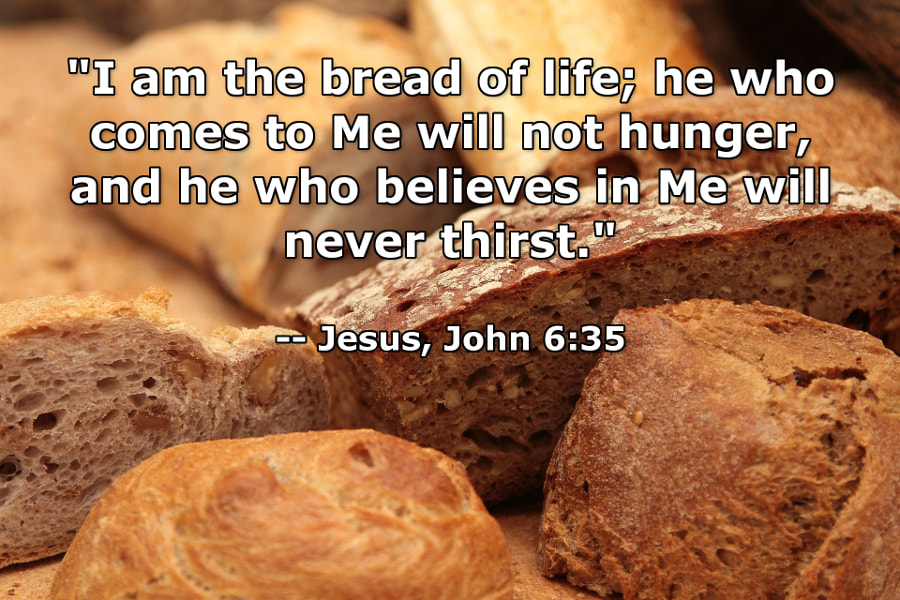
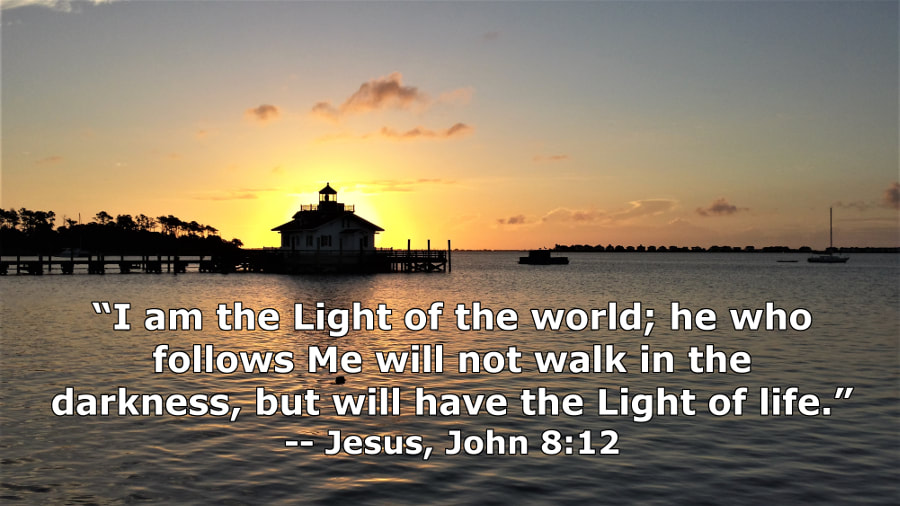
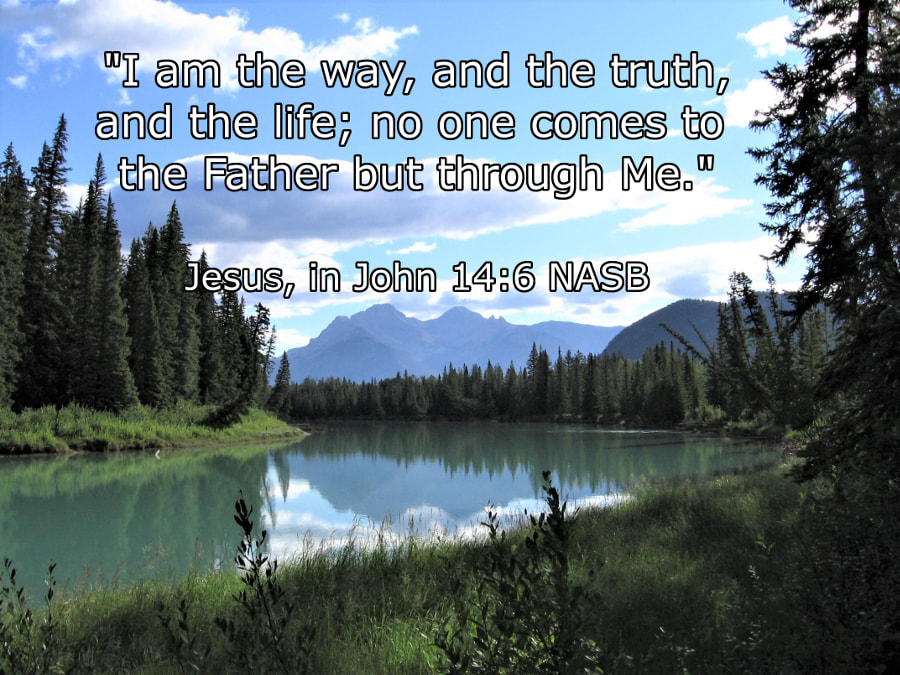
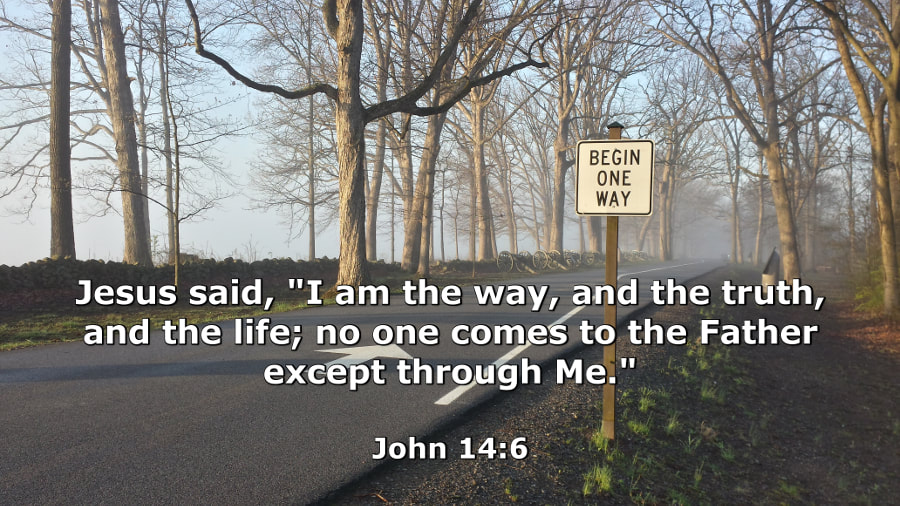
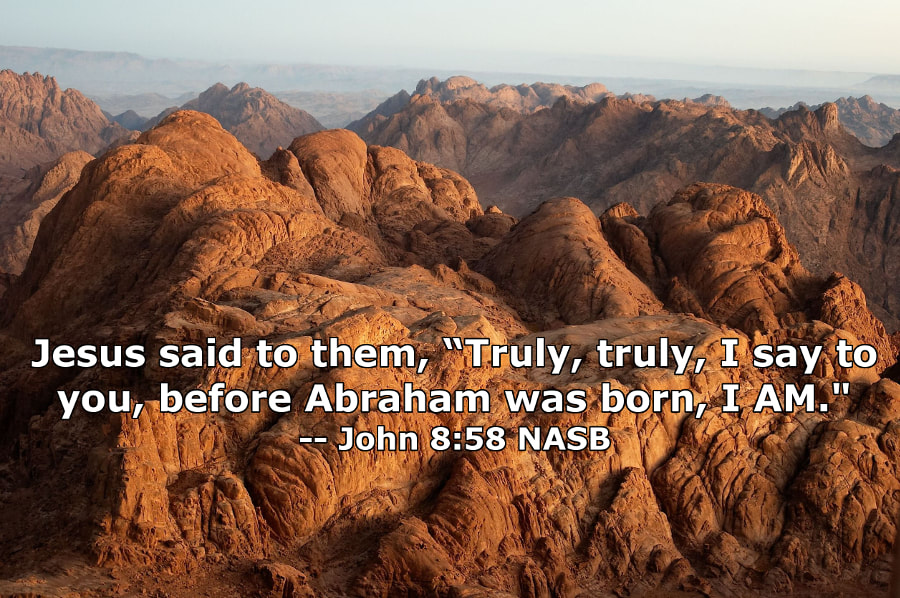
 RSS Feed
RSS Feed
